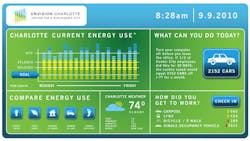Smart Cities Using Smart Technology
Why would the ability of machines talking to machines benefit cities? Well if the machines are talking about how to better use resources such as electricity and water, then it’s a conversation that city administrators want to hear.
With a rallying cry of “Aspiring to Create the Most Sustainable Urban Core in the Nation,” Charlotte, N.C. is an example of a city that is leveraging connected technologies, such as smart meters talking to each other, to create a more sustainable city.
Envision Charlotte is the umbrella group behind the city’s goal to “drive economic growth by reducing waste, water and energy and improve air quality.”
Turning the vision into reality is achieved by collaboration between the city, utilities and technology providers in order to help citizens make smarter choices.
The city’s first goal was to reduce overall energy consumed in participating office buildings by 20% within five years. The initiative is focused on office buildings within Charlotte’s 1.94 square-mile commercial business district.
"We have cracked the code in understanding and measuring how energy is used and wasted within these buildings, and we are implementing programs today that are making a real difference in helping these businesses save money,” said Amy Aussieker, executive director of Envision Charlotte. Charlotte is among the first cities in the world to have developed a measurable program in more than 60 buildings within the central business district, representing more than 20 million square feet of office space
In fact last month at the Clinton Global Initiative, the group working with Duke Energy, was able to reduce energy consumption by 8.4% saving businesses an estimated $10 million.
Other key partners include Cisco, which provides technology to display real-time data, Verizon, which provides technology for energy meters and kiosks; and Itron, which provides smart meters.
“Electronic metering has been serving the utility sector for the past 35 years,” explains Russ Vanos, senior vice president of Itron, “but that information has been transmitted over proprietary networks. Using open architecture that information can be shared and more importantly used to help cities make smarter choices. ”
Itron, which has manufacturing plants both in the U.S. and across the globe, saw a business opportunity to moving to Cisco routers which had strong security and network management. “It was a business risk that was worth taking,” said Vanos. “The R&D that Cisco is able to supply was beyond what we could provide.”
Cisco has had a strong hand in enabling the push behind the smart city concept. Their Smart+Connected Communities solutions provides the underpinning technology that supplies data necessary to solve problems that cities face including pollution, inadequate infrastructure and other resource constraints.
What Itron brings to the table for smart city development is its large market share globally for water and gas. In fact last year the company completed the installation of a combination of 25,000 smart water, heat and gas meters and communication modules as well as its fixed network for Sino-Singapore Tianjin Eco-City in Tianjin, China.
“The smart city movement is an exciting area of business for as and is a natural evolution of the smart grid which is already built up,” says Vanos. “We believe strongly that as the demand on world energy and water supply intensifies having more data and more access to that data is key to helping cities be more resourceful.”
Another city that Itron is assisting is Detroit. The company will share a demo of smart capabilities at the upcoming “Meeting of the Minds” that will take place on Sept. 30- Oct. 2. Vanos will present a workshop entitled “Retrofitting Legacy Infrastructure with Smart City Solutions.”
At the conference over 350 leaders from across the globe representing public, private, and non-profit sectors will converge in Detroit and present solutions and strategies from around the world on creating smarter cities.
Perhaps the city of Charlotte explains the concept of Smart Cities best. “Envision Charlotte is a fantastic example of collaboration by public and private entities with shared goals of environmental sustainability,” said Michael Smith, CEO of Charlotte Center City Partners. “It is a unique laboratory that allows our city to develop proven sustainability practices that can be replicated in other cities.”
